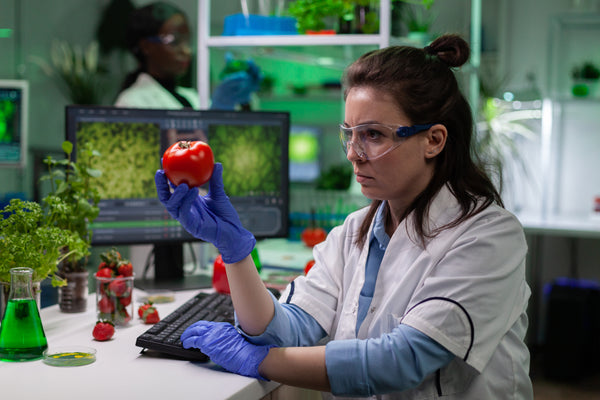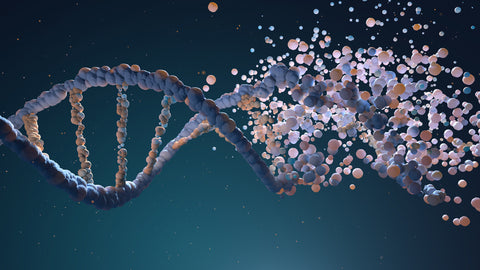
What are GMO products?
Share
What are GMO products?
Genetically modifying foods may sound like a concept out of a science fiction movie, but many of the things we eat, as well as the ingredients animals consume, have been DNA-altered.
To obtain the GMO products, scientists use the process of genetic engineering, which is also called modern biotechnology, gene technology or recombinant DNA technology.

What are GMO products?
Genetically modified foods have altered DNA, using genes from other plants or animals. Scientists take the gene for a desired characteristic of one plant or animal and insert it into the cell of another.
The process of creating genetically modified foods differs from selective breeding. It involves the selection of plants or animals with desired characteristics and their propagation. Over time, this results in offspring with these desirable characteristics.
What is GMO as a concept?
A GMO, or genetically modified organism, is a plant, animal, microorganism, or other organism whose genetic makeup has been altered in a laboratory using genetic engineering. In this way, combinations of plant, animal, bacterial and viral genes are created that are not found in nature or through traditional cross-breeding methods.
Which foods are genetically modified and why?
It is a curious fact that the first genetically modified food was the tomato introduced in 1994. But modern technology is not limited to food. Genetically modified cotton can be used in textiles, and scientists can modify organisms to be used in medicine.
The first such product was human insulin, produced in 1982. It was produced with genetically modified bacteria.
Otherwise, in general, cotton, corn, and soybeans are the main genetically modified crops grown in the United States. GMOs can be made into products such as corn starch, corn syrup, soybean oil, canola oil, corn oil or granulated sugar.
Other crops that are most often the result of genetic modification:
• potatoes
• apples
• sugar beet
• soy
• corn
• rapeseed
• papaya
• alfalfa
About 94% of soybeans are GMO, but most of the crop is used for animal feed.
It is also used to make soybean oil and emulsifiers such as soy lecithin, and can be found in many processed foods, such as:
• cereals
• vegetarian alternatives to meat
• baking mixes
• tortillas
• granola bars
• tofu
The main reasons for genetic modification are to help crops resist disease and herbicides that are used to control weeds or other plants that may have a negative impact on cultivation.
The use of GMO products can lower food prices by improving the amount of crops that can be harvested. And this, in turn, increases reliability during uncertain or unfavorable growing seasons.
Potential benefits of GMO crops include some consumer appeal, such as better sustainability, higher nutritional value and less waste.
Possible benefits of genetic engineering also include:
• more nutritious food
• disease and drought resistant plants that require fewer environmental resources (such as water and fertilizers)
• less use of pesticides
• greater supply of food with a lower price and a longer shelf life
• tastier food
• faster growing plants and animals
• foods with more desirable characteristics, such as potatoes, which produce fewer cancer-causing substances when fried
• medicinal foods that can be used as vaccines or other medicines
Does the use of GMO products pose health risks?
Critics of genetically modified foods argue that the products could introduce allergens, make bacteria resistant to existing antibiotics or be toxic, among other concerns. They also call for longer-term studies, arguing that the existing evidence does not track (in most cases) more than a few months.
The Food and Drug Administration and the World Health Organization say that genetically modified foods on the market are as safe (and healthy) as foods that have not been genetically modified.
However, some people continue to express concern about GMO foods, such as:
• creating foods that can cause an allergic or toxic reaction
• unexpected or harmful genetic changes
• unintentional transfer of genetic material from one GMO plant or animal to another plant or animal not intended for genetic modification
• crops that have a lower nutritional value
Genetic engineering of food is a relatively new practice, which means that the long-term safety implications are not yet clear. Many of the concerns about deficiencies relate to human health. Scientists have not yet proven that GMO foods are harmful to health, but research continues.
Allergic reactions
There is a small risk that GMO foods will cause an allergic reaction, but this will only happen if the genetic change causes the allergen to be produced.
Antibacterial resistance
Some GMOs contain changes that make them resistant to certain antibiotics. In theory, genes from these plants could end up in humans or animals when they consume them. As a result, the person or animal could also develop antibiotic resistance.
Crab
There are concerns that the consumption of GMO foods may contribute to the development of cancer by increasing the levels of potentially carcinogenic substances in the body.
Toxicity to body organs
Some researchers are calling for further studies because they suggest that GMO foods may affect the liver, kidneys, pancreas and reproductive system.
Changes in human DNA
Again, in a 2009 study, some scientists noted that the DNA of foods can survive in the gut, and there are concerns that this could affect the immune system. Some people also express concerns that the consumption of GMO foods may cause genetic changes in humans.
 Conclusion
Conclusion
Although ingredients produced from genetically modified plants and animals are regulated to ensure they are safe for consumption, some researchers say their effects on the human body are not fully understood.
So far, there is no scientific evidence that GMOs are harmful to human health, but there are also no long-term studies to confirm their safety.
Another cause for concern is that because these foods are designed to withstand herbicides, the plants are being sprayed with more toxic substances that remain in the food. Two things are certain — GMO-containing foods are entering the market at a rapid pace and are found in most processed foods.
Being informed about what GMOs are, how they can affect your body, and which foods contain them is part of a healthy and balanced life.
Maybe we should not focus too much on avoiding GMOs, because that is almost impossible. Instead, focus on eating a wholesome and varied diet that is rich in fruits and vegetables and low in added sugar and processed foods.
Food manufacturers are not required to label whether their food is genetically modified, but GMO labeling advocates continue to raise concerns about the issue. Until the laws change, we must find an answer to the question of how to keep genetically modified organisms out of our daily lives.
Finally, here are some guidelines to help you minimize GMOs in your diet:
• buy foods labeled as 100% organic
• choose bulk foods that you can prepare yourself instead of processed or pre-packaged — this is also a good way to create habits for a more sustainable lifestyle
• look for non-GMO labels
• shop at local farmers' markets—they are much less likely to have genetically modified foods
(SRC: www.forlife.bg)

